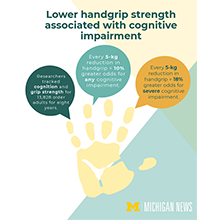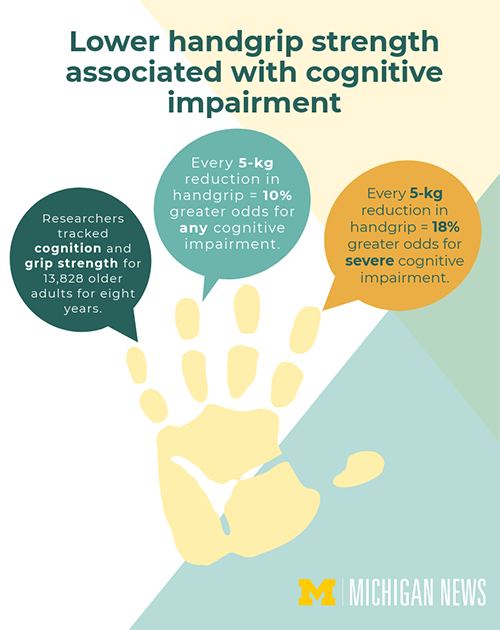23 August 2019

Ann Arbor, MI, US – For older Americans, poor handgrip may be a sign of impaired cognition and memory, a new study suggests.
Researchers from the University of Michigan and North Dakota State University followed nearly 14,000 participants from the 2006 Health and Retirement Study, age 50 and older, for eight years.
They found that every 5-kg reduction in handgrip strength was associated with 10% greater odds for any cognitive impairment and 18% greater odds for severe cognitive impairment.
They assessed handgrip with a hand-held dynamometer, and cognitive function with a modified Mini-Mental State Examination, a widely used test among the elderly that includes tests of orientation, attention, memory, language and visual-spatial skills.
Study co-author Sheria Robinson-Lane, assistant professor at the U-M School of Nursing, said the findings are important for providers and individuals seeking ways to retain physical and mental function.
The findings, published in the Journal of Alzheimer's Disease, contribute to mounting evidence that providers should include grip strength – not currently used – in routine health assessments for older adults, said first author Ryan McGrath, assistant professor at North Dakota State University.
More importantly, the researchers interpreted the findings to mean that a reduction in grip strength is associated with neural degeneration, which underscores the importance of muscle-building exercise.
"These findings suggest that this is another instance where you're seeing that staying physically active affects your overall health and your cognitive health," Robinson-Lane said.

Graphic Credit: Michigan News
###
NOTES FOR EDITORS
Full study: McGrath R, Robinson-Lane SG, Cook S, Clark BC, Herrmann S, O'Connor ML, Hackney KJ (2019) Handgrip Strength Is Associated with Poorer Cognitive Functioning in Aging Americans. J Alzheimers Dis (doi: 10.3233/JAD-190042).
Other co-authors of the study included investigators from the University of New Hampshire, Ohio University and Sanford Research. The research was funded by the College of Human Development and Education at North Dakota State University, the National Institutes of Health and the National Institute on Aging.
Contact
Laura Bailey, +1 734-647-1848, baileylm@umich.edu
About the Journal of Alzheimer's Disease
Now in its 22nd year of publication, the Journal of Alzheimer's Disease (JAD) is an international multidisciplinary journal to facilitate progress in understanding the etiology, pathogenesis, epidemiology, genetics, behavior, treatment, and psychology of Alzheimer's disease. The journal publishes research reports, reviews, short communications, book reviews, and letters-to-the-editor. Groundbreaking research that has appeared in the journal includes novel therapeutic targets, mechanisms of disease, and clinical trial outcomes. JAD has a 2018 Journal Impact Factor of 3.517 according to Journal Citation Reports (Web of Science Group, 2019). The journal is published by IOS Press. j-alz.com
About IOS Press
IOS Press is headquartered in Amsterdam with satellite offices in the USA, Germany, India and China and serves the information needs of scientific and medical communities worldwide. IOS Press now publishes more than 80 international peer-reviewed journals and about 75 book titles each year on subjects ranging from computer science, artificial intelligence, and engineering to medicine, neuroscience, and cancer research. iospress.com







